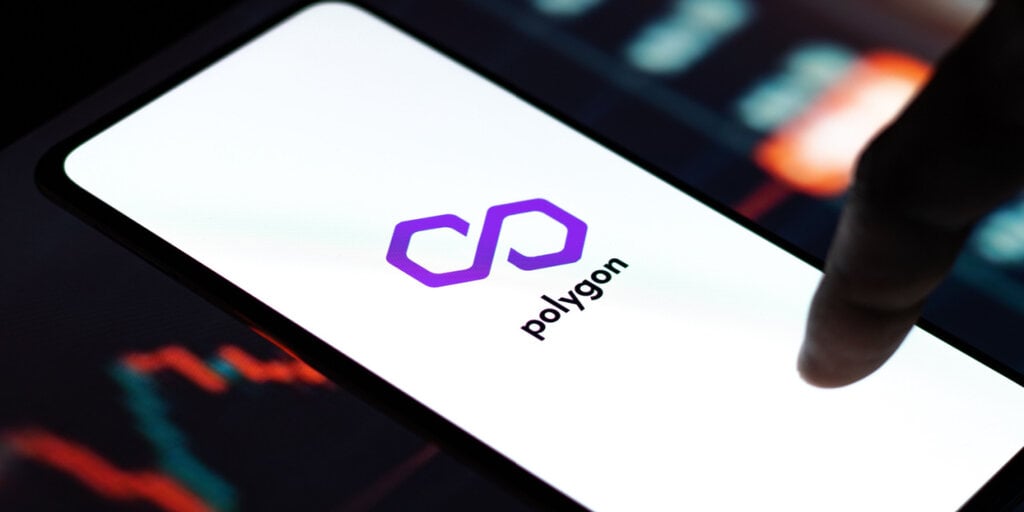matic-network
Polygon Is Migrating From MATIC to POL: Here’s Everything You Need to Know
Published
4 months agoon
By
admin

Polygon Labs is making major strides toward the future of its network on Wednesday.
On September 4, the Ethereum scaling network will complete a migration from its longstanding MATIC token to POL, which will then become the native token of its network. The migration forms an integral part of the Polygon 2.0 roadmap.
Ahead of the shift, here’s a look at what to expect from the migration—and what you need to do if you’re a MATIC holder.
What is the “MATIC” to “POL” migration?
The POL migration will phase out MATIC as Polygon’s native token.
In lieu of MATIC, POL will become the native gas and staking token for Polygon’s main proof-of-stake chain, Polygon said in a July blog post.
Why is Polygon moving to POL?
The POL migration sets the groundwork for Polygon 2.0, the roadmap for Polygon’s evolution into a zero-knowledge Ethereum Virtual Machine (zkEVM) system, complete with its own network of interoperable application-specific blockchains.
Per Polygon, POL will bring added utility to the network. As with MATIC, Polygon blockchain validators that participate in staking may earn rewards by restaking their POL to secure other chains in the Polygon supernet.
In subsequent updates, POL will be employed to secure other blockchains within Polygon’s broader “aggregated” network, aka the “AggLayer,” which is a core component of Polygon 2.0.
The AggLayer will aggregate zero-knowledge proofs from all connected chains and ensure the security of near-instant, atomic cross-chain transactions, Polygon explained in a blog post in January.
Do users need to do anything before the POL migration?
MATIC holders on the Polygon proof-of-stake chain do not need to do anything ahead of the POL migration, according to Polygon. Their tokens will be converted automatically to POL.
Meanwhile, MATIC holders on the Ethereum network may migrate their tokens to POL via the Polygon Portal Interface.
MATIC holders on the Polygon zkEVM layer-2 network or centralized exchanges may also have to take some action to upgrade MATIC to POL, such as bridging them to Ethereum. An already-deployed migration contract is available to help holders switch from MATIC to POL on Ethereum in a permissionless manner. Polygon warns, however, that this process is for advanced users.
Finally, MATIC holders that hold MATIC as ERC-20 tokens in hardware wallets such as Ledger may need to manually convert to POL using their wallet, although Polygon has not yet detailed this process.
When is the deadline for converting MATIC to POL?
There is currently no deadline for MATIC holders on Ethereum and Polygon zkEVM to convert MATIC to POL, per Polygon’s blog post.
However, the Polygon community may be granted the authority to establish a deadline in the future, Polygon said in its post.
Daily Debrief Newsletter
Start every day with the top news stories right now, plus original features, a podcast, videos and more.
Source link
You may like


Possible Deep Correction Could Push Cardano Price To $0.43, Here’s How


Crypto whales stockpile these 3 altcoins before the next bull run


Sonic Chain Launches Ethereum Bridge, FTM Price Reacts


Christmas gift as MOVE, BGB, ZEC lead altcoin gainers


MoonPay Considering $150,000,000 Acquisition of Crypto Payment Firm Helio: Report


Shiba Inu Burn Rate Soars 100% As Community Lauds Major Milestones
gaming
Ultra-Rare Pokémon Card Valued at $250K Going on Auction via Ethereum Network Polygon
Published
3 weeks agoon
December 6, 2024By
admin
A pristine, first-edition Holographic Charizard Pokémon card from 1999 is going up for auction Friday, tokenized via Ethereum scaling network Polygon and auctioned by collectibles platform Courtyard.
Polygon Labs and Courtyard have teamed up to tokenize the PSA 10-graded card, securely stored in a Brink’s vault, with an estimated value of $250,000. The 30-day online auction aims to demonstrate blockchain’s potential in the collectibles market, the companies said.
“This auction isn’t just about a Charizard card; it’s about showing how blockchain can revolutionize the collectibles world,” said Polygon Labs CEO Marc Boiron, in a statement. “From traditional collectors to DeFi enthusiasts, we’re inviting everyone to experience the benefits of on-chain ownership.”

The digital platform enables the sale of physical items (like cards) via blockchain tokens, or NFTs, with features including secure storage, high-resolution 3D models, and instant global trading. Collectors can access an immutable ownership record and trade without physical shipping complications. Owners who want to have the physical card in hand can have it shipped to them from the vault at any point.
According to a Polygon Labs representative, the company “purchased the card directly from a reputable seller in the trading card space.” Similar cards have been sold for prices between $264,000 and nearly $400,000 since 2020, per data from Public.com.
“Tokenization is changing the game for collectibles,” said Courtyard CEO Nicolas le Jeune, in a statement. “With this auction, we’re not just spotlighting an iconic card; we’re demonstrating how Courtyard’s platform is transforming how people collect and trade.”
Editor’s note: This article was written with the assistance of AI. Edited and fact-checked by Andrew Hayward.
GG Newsletter
Get the latest web3 gaming news, hear directly from gaming studios and influencers covering the space, and receive power-ups from our partners.
Source link
Law and Order
SEC Sues Crypto Trading Firm Cumberland, Again Alleges Solana and Polygon Are Securities
Published
3 months agoon
October 10, 2024By
admin

The U.S. Securities and Exchange Commission announced Thursday that it has charged Cumberland DRW, a Chicago-based crypto trading firm, with various securities charges.
In an announcement, the SEC said that Cumberland operated as an unregistered dealer in handling more than $2 billion worth of cryptocurrencies.
The complaint alleges that Cumberland traded “crypto assets that are offered and sold as investment contracts on third-party crypto asset exchanges.”
The SEC complaint mentions five assets that the regulator considers to be securities, including Solana, Polygon, Cosmos, Algorand, and Filecoin. The complaint notes, however, that it is a “non-exhaustive” list of such assets.
“Despite frequent protestations by the industry that sales of crypto assets are all akin to sales of commodities, our complaint alleges that Cumberland, the respective issuers, and objective investors treated the offer and sale of the crypto assets at issue in this case as investments in securities,” said Jorge G. Tenreiro, Acting Chief of the SEC’s Crypto Assets and Cyber Unit (CACU), in a statement.
“Cumberland profited from its dealer activity in these assets without providing investors and the market with the important protections afforded by registration,” Tenreiro added.
Cumberland did not immediately respond to Decrypt’s questions, but posted a statement on Twitter (aka X) that it wouldn’t be “making any changes to our business operations or the assets in which we provide liquidity” due to the lawsuit.
“We’re ready to defend ourselves again,” it added, referring to a 2018 lawsuit from the Commodities and Futures Trading Commission against DRW, which the investment firm won.
Cumberland is the crypto trading subsidiary of Chicago-based investment firm DRW. It specializes in making institutional-sized markets in Bitcoin and other digital assets.
The SEC has hit a number of digital asset firms—including major American exchanges Coinbase and Kraken—with lawsuits for allegedly selling unregistered securities in the form of cryptocurrencies.
But the approach has attracted the ire of those in the industry and some U.S. politicians, who claim the regulator and its Chair Gary Gensler have adopted a “regulation by enforcement” approach to watchdogging the industry.
Edited by Andrew Hayward
Editor’s note: This story was updated after publication with additional details.
Daily Debrief Newsletter
Start every day with the top news stories right now, plus original features, a podcast, videos and more.
Source link
matic-network
Australia’s Vinyl Group Hits the Right Note with $1.6M Serenade Crypto Collectibles Deal
Published
3 months agoon
September 30, 2024By
admin

Vinyl Group, Australia’s only listed music company, has acquired the assets of London-based Serenade, a platform focused on digital and physical collectibles, in an equity-based deal valued at up to US$1.6 million.
Vinyl launched its website last year, aiming to replicate the experience of “crate-digging” for records in digital form, CEO Josh Simons told Decrypt. The acquisition marks the group’s expansion into the UK and European markets while enhancing its offerings in the digital collectibles space.
“The plan was always to expand Vinyl.com’s offering to include music merchandise, digital collectibles, and experiences that connect fans with creators, and the acquisition of Serenade was the next step in that process,” Simons said.
Under the terms of the deal, Vinyl has made an upfront payment of $553,000 in shares, with an additional $1 million in shares contingent upon revenue and earnings targets.
The deal was finalized over the weekend, with Vinyl notifying Serenade that due diligence requirements had been successfully met. Vinyl’s share price jumped more than 8% on the ASX on Sunday following the announcement, rising to a three-week high above $0.06.
The performance-related earn-out requires the combined business of Vinyl.com and Serenade to achieve $2.76 million in revenue and $345,000 in earnings before interest and taxes within 12 months of the acquisition.
Serenade, which operates a marketplace for both physical and digital collectibles, has previously supported over 200 global artists, including high-profile names such as Liam and Noel Gallagher, Muse, and Sum 41.
The company also has partnerships with major record labels, including Warner Music Group and Beggars Group.
Serenade operates on the Polygon blockchain, a layer-2 scaling solution for Ethereum. Its key product, NFC-enabled digital “Smart Formats” built atop Polygon’s infrastructure, has seen 56% month-on-month sales growth since its launch in January, the company claims.
NFC-enabled digital Smart Formats are physical collectibles embedded with Near Field Communication technology that link to a digital asset or experience, typically hosted on a blockchain.
These formats allow users to access digital content, such as music, exclusive videos, or digital artwork, by interacting with the physical item through their smartphone or other NFC-enabled devices.
Serenade CEO Max Shand will join Vinyl Group under a full-time employment agreement. Shand will receive five million options, vesting in stages upon achieving specific performance goals as part of his incentive package.
Daily Debrief Newsletter
Start every day with the top news stories right now, plus original features, a podcast, videos and more.
Source link

Possible Deep Correction Could Push Cardano Price To $0.43, Here’s How

Crypto whales stockpile these 3 altcoins before the next bull run

Sonic Chain Launches Ethereum Bridge, FTM Price Reacts
Referrals

Christmas gift as MOVE, BGB, ZEC lead altcoin gainers

MoonPay Considering $150,000,000 Acquisition of Crypto Payment Firm Helio: Report

Shiba Inu Burn Rate Soars 100% As Community Lauds Major Milestones

A Very Bitcoin Christmas

From DMM Bitcoin to the US Government: Largest Crypto Exploits and Hacks of 2024

Access control exploits account for nearly 80% of all crypto hacks in 2024

Will XRP Price Break All-Time Highs In 2025?

Why it’s a better investment than Solana or Ripple in 2024

Six Bitcoin (BTC) Mutual Funds to Launch in Israel Next Week: Report

What Happens If Paul Atkins Dismisses the XRP Lawsuit?

Malicious Google ad campaign redirects crypto users to fake Pudgy Penguins website
182267361726451435

Why Did Trump Change His Mind on Bitcoin?

Top Crypto News Headlines of The Week

New U.S. president must bring clarity to crypto regulation, analyst says

Will XRP Price Defend $0.5 Support If SEC Decides to Appeal?

Bitcoin Open-Source Development Takes The Stage In Nashville

Ethereum, Solana touch key levels as Bitcoin spikes

Bitcoin 20% Surge In 3 Weeks Teases Record-Breaking Potential

Ethereum Crash A Buying Opportunity? This Whale Thinks So

Shiba Inu Price Slips 4% as 3500% Burn Rate Surge Fails to Halt Correction

Washington financial watchdog warns of scam involving fake crypto ‘professors’

‘Hamster Kombat’ Airdrop Delayed as Pre-Market Trading for Telegram Game Expands

Citigroup Executive Steps Down To Explore Crypto
Mostbet Güvenilir Mi – Casino Bonus 2024

NoOnes Bitcoin Philosophy: Everyone Eats
Trending

 3 months ago
3 months ago182267361726451435

 Donald Trump5 months ago
Donald Trump5 months agoWhy Did Trump Change His Mind on Bitcoin?

 24/7 Cryptocurrency News4 months ago
24/7 Cryptocurrency News4 months agoTop Crypto News Headlines of The Week

 News4 months ago
News4 months agoNew U.S. president must bring clarity to crypto regulation, analyst says

 Price analysis5 months ago
Price analysis5 months agoWill XRP Price Defend $0.5 Support If SEC Decides to Appeal?

 Opinion5 months ago
Opinion5 months agoBitcoin Open-Source Development Takes The Stage In Nashville

 Bitcoin5 months ago
Bitcoin5 months agoEthereum, Solana touch key levels as Bitcoin spikes

 Bitcoin5 months ago
Bitcoin5 months agoBitcoin 20% Surge In 3 Weeks Teases Record-Breaking Potential


